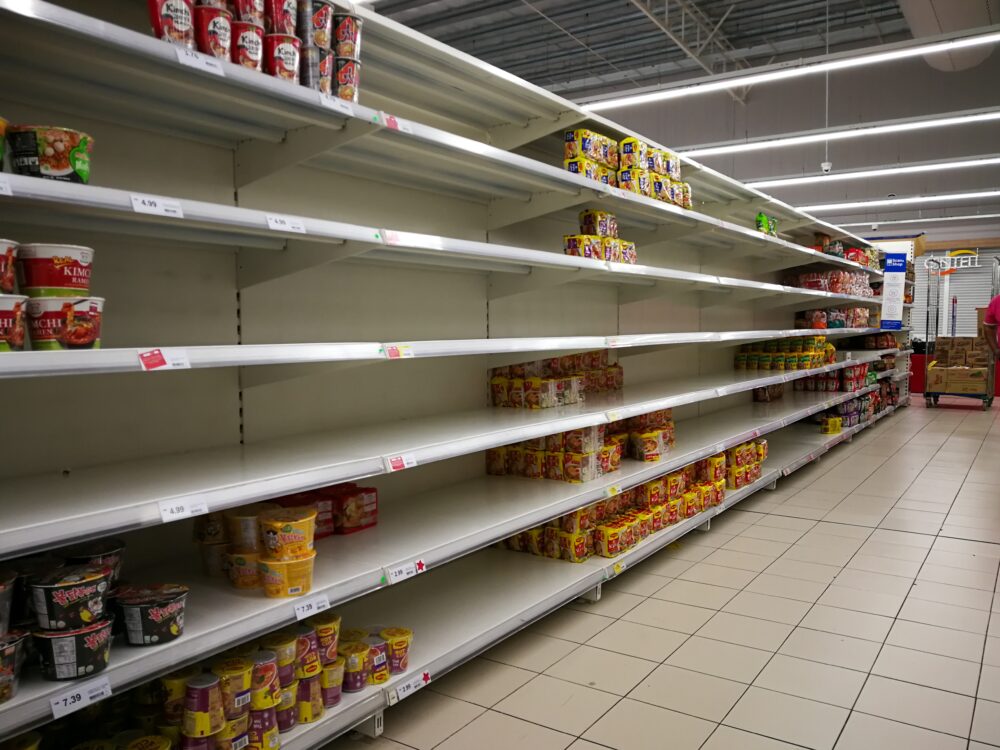Memories of panic buying may be fading here in the UK but have resurfaced elsewhere. The near constant threat of another wave of Covid-19 may yet prompt another round of hyper demand. Whilst there is little hard evidence to determine the underlying drivers of panic buying, there are numerous theories that the retail industry may benefit from exploring.
Feroud Seeparsand, dunnhumby’s Senior Consumer Psychologist, outlines some likely theories to explain the ‘why’ behind the ‘panic buy’ and some implications for retailers to prevent it reoccurring in future.

1. Loss Aversion
Nobel Prize-winning economist Daniel Kahneman stated that ‘loss aversion’ was his and Amos Tversky’s single greatest contribution to decision-making theory.
🏆
The 2024 Creative Retail Awards are open for entries.
The Creative Retail Awards are much more than a mere accolade; they represent the pinnacle of achievement in the retail industry. Garnering a nomination or winning one of these awards is a testament to innovation, excellence, and leadership.
www.creativeretailawards.com
We feel the pain of loss more than an equivalent gain. In other words, losing £100 hurts more than the joy of winning £100. When applied to panic buying, we fear for the loss of a product we could otherwise have had. Perhaps more to the point, we would normally have had access to a variety of products. Relative to this normal point of reference, the relative loss of not possessing a product helped lead to panic. As customers would normally possess a certain product, the relative loss of it created pain.
A curious detail is that small numbers can make big differences, a concept called ‘diminishing sensitivity’; winning £200 does not double the joy relative to winning £100. In other words, even small numbers of a valued product can have a significant effect on one’s decision making. It is because of this diminishing sensitivity customers may lean towards zero risk aversion, in other words not to risk missing out on a product; if you see it, buy it!
Implication for retailers: Use the new reference point that past panic buying did not stop most customers obtaining products.
2. Social Norms
Another Nobel Prize-winning economist, Richard Thaler, and his colleague Cass Sunstein highlighted numerous heuristics to nudge behaviour; one of these is social norms or copycat behaviour. We are perhaps all guilty of assuming restaurants with longer queues have superior dishes or assuming that the more popular films, plays or books are worth consuming. When applied to retail, if a customer sees another purchasing a particular item, the odds are that they will follow. This can easily be exaggerated through social media and news reports.
It does not matter if this perception is factually inaccurate; perception will still hold sway. If customers do cause products to sell out as a result, this is likely to lead to a scarcity effect, where those products are valued even more than before. This can be further exacerbated if such products are perceived to be potential life savers, like hand sanitisers or medicine.
Implication for retailers: Highlight how most people are not panic buying. Foodstuffs North Island and South Island, in New Zealand, got out ahead by introducing their ‘Shop Normal’ campaign, which encouraged customers to ‘shop normally and be kind in supermarkets’. Tesco in the UK also ran a ‘Together we can do this’ campaign in national media to encourage people to ‘shop normally together’.
3. Uncertainty Breeds a Desire for Control
Sometimes the actions that can save lives, such as hand washing and social distancing, are simply not enough to regain a sense of control, as they are too dependent upon the goodwill of others. Therefore, there remains a need to reduce anxiety. Stockpiling or buying more, as a form of retail therapy, is a manner for regaining control.
Scientists have found uncertainty leads to the consumption of utilitarian products (such as cleaning agents and cooking ingredients), i.e. products that give you something to do. Shoppers are less likely to be interested in the latest fashion trends. When one adds to the mix a virus that demands hygiene, the hyper-demand for particular products can be better understood. The same scientists explore the concept of ‘displaced coping’, where shoppers purchased items that are of no direct relevance to their uncertainty. This may go one step to explain the recent insatiable worldwide desire for toilet paper.
Implication for retailers: Provide customers with products that may provide a sense of control, such as gardening, DIY, crafts, puzzles.
4. Game Theory
Whilst behavioural economics and nudge theory assume irrationality, game theory (which also can claim a Nobel Prize by John Nash, as featured in the film A Beautiful Mind), assumes rationality.
In the same way panic buying exists, customers may panic and create a bank run, where customers take money out en masse which then collapses a bank. In one study, it was found that asking participants to recount a time when they felt fear was found to increase the likelihood of a bank run in the form of a game format. There was some evidence that inducing sadness was less likely to create a bank run. Given the emotion of fear led to bank runs, it is of little wonder that the fear of a pandemic may have led to panic buying.
Implication for retailers: Influence emotion to avoid fear (e.g. through in-store media and music).
5. Personality Theory
A recent global survey addressed toilet paper hoarding through personality traits. It was found that customers who felt more threatened by the pandemic, possessed greater emotionality and greater conscientiousness (i.e. planned more) led to more toilet paper hoarding. This study may suggest that appealing to higher values, (i.e. encouraging responsible behaviour) may not help to avoid panic buying.
Implication for retailers: Encourage long term planning and purchase of long shelf life products, to ease supplies if a second or third wave returns.

This is not an exhaustive causal list, but instead focuses on theories that could have at least some practical application to limit panic buying. The theories covered include areas that assume irrationality, such as behavioural economics and nudge theory, or rationality such as game theory. Other theories may sit more on the fence.
Whatever the drivers for panic buying this is a topic that retailers need to address. Even if panic buying does not reoccur within the Covid-19 pandemic, it is likely to return in some future event whether it be a natural disaster, climate change, strikes or supply shortages.














